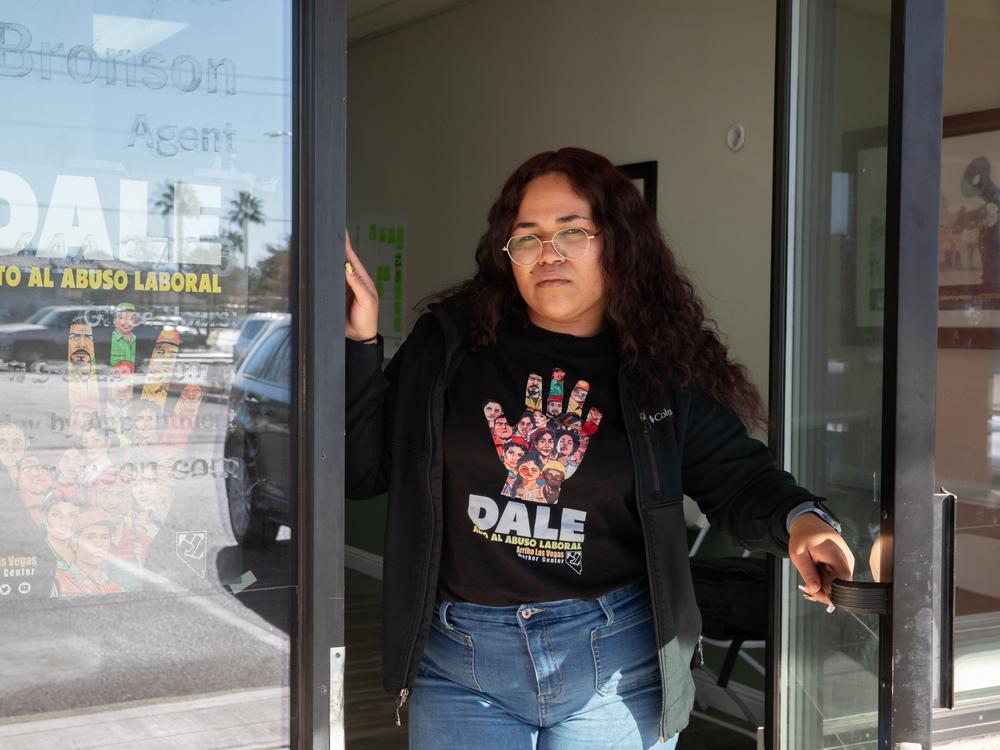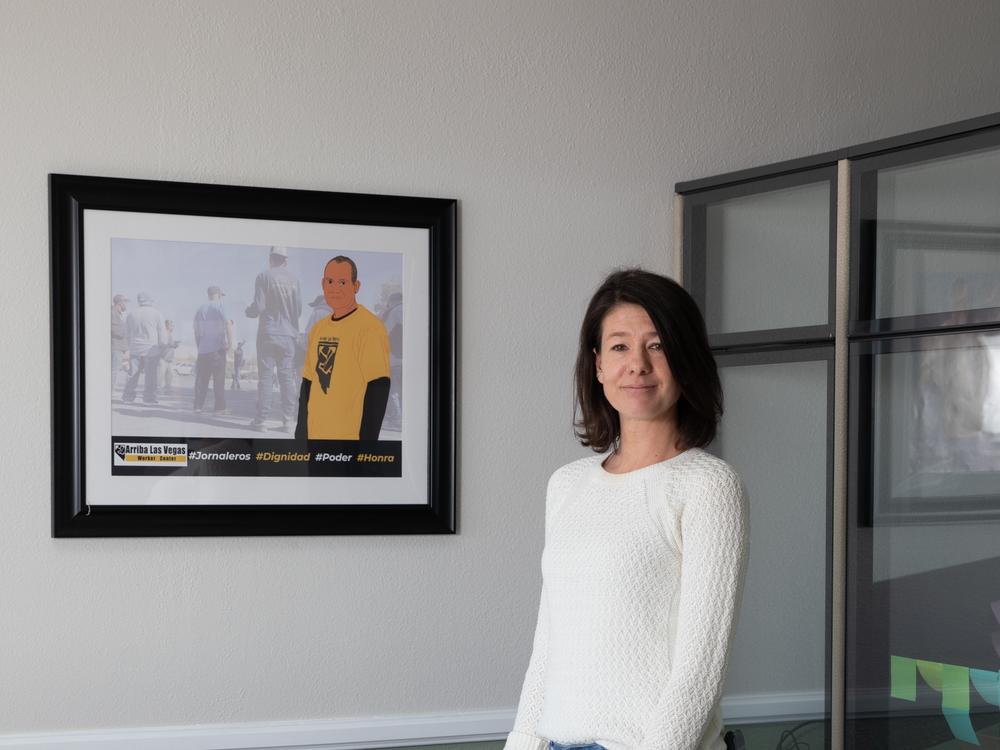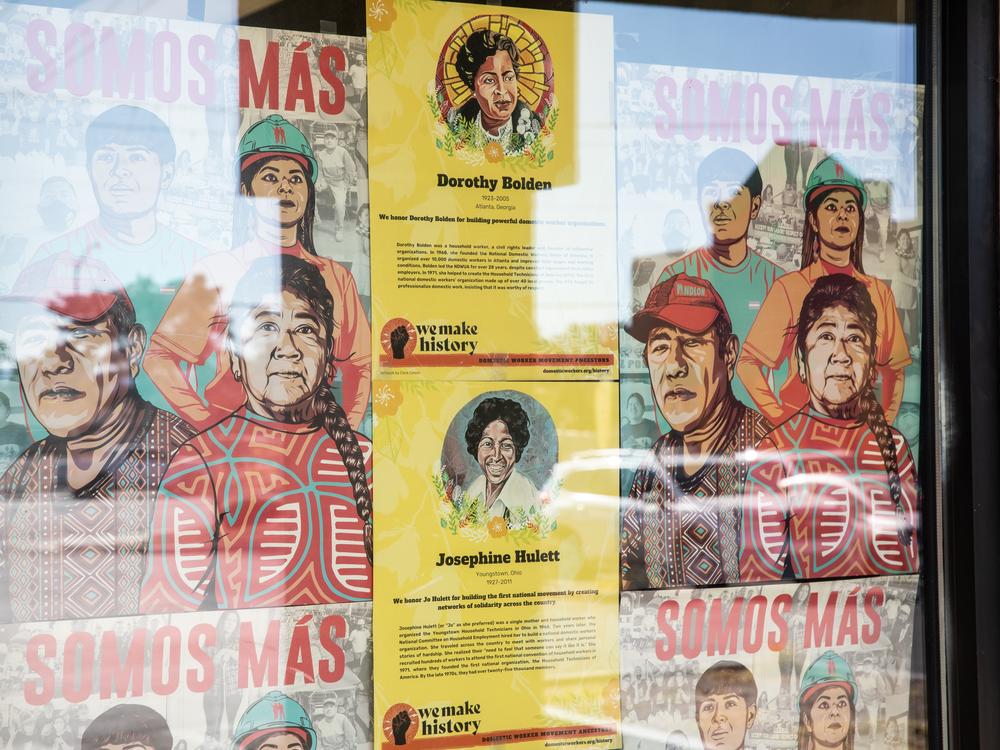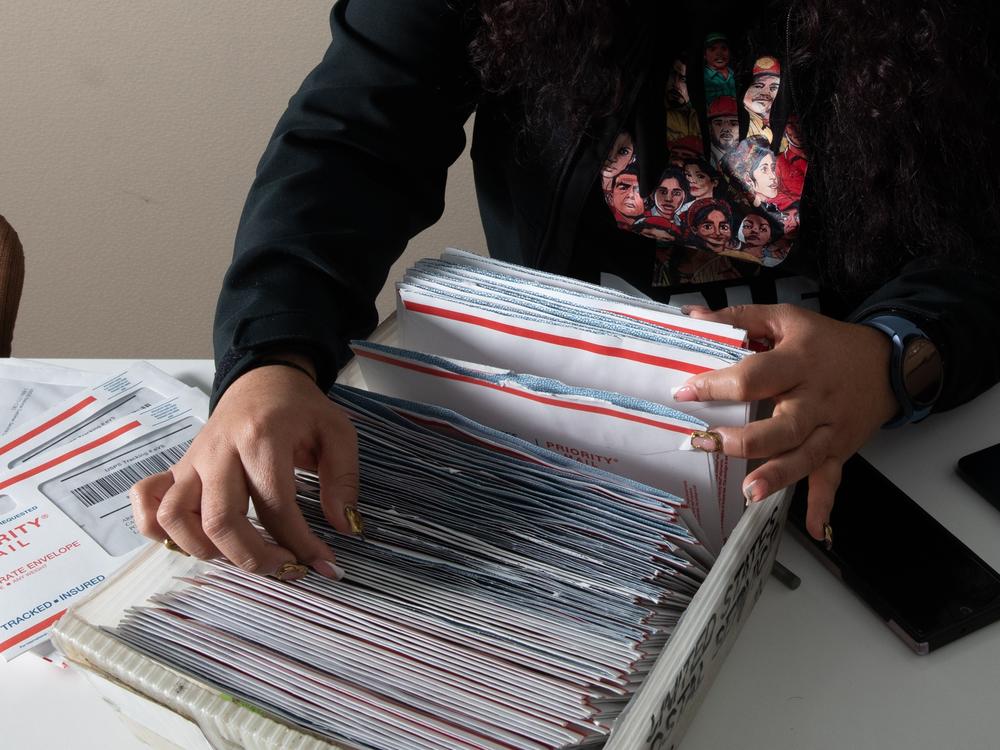Section Branding
Header Content
Immigrant workers are helping investigate labor abuses. Will Trump let them stay?
Primary Content
LAS VEGAS — For months, the Arriba Las Vegas worker center was getting deluged with mail. Each day brought another hundred or so letters, addressed to immigrants working in construction, landscaping, at warehouses and in other industries.
Inside each envelope was a notice from the U.S. government to appear for fingerprinting.
The biometrics appointments represent the final step in getting the workers, who lack legal immigration status, protection from deportation and authorization to work.
"Every letter that I open — I know it's a dream," said Arriba Las Vegas organizer Karin Martinez in Spanish, as she opened the envelopes. "It's a light at the end of the tunnel for all these people."
A tool for labor enforcement
Arriba Las Vegas has helped about 1,000 immigrants who were working illegally in the U.S. through this process under a policy advanced by the Biden administration.
Workers who have experienced or witnessed workplace abuse, such as wage theft or discrimination, have received temporary protection from deportation and social security numbers in exchange for their participation in labor investigations.
The aim of the program, known as Deferred Action for Labor Enforcement, or DALE, is to help under-resourced labor agencies go after employers they allege violated the law.
"Unscrupulous employers who prey on the vulnerability of noncitizen workers harm all workers and disadvantage businesses who play by the rules," said Homeland Security Secretary Alejandro Mayorkas in a statement in January 2023. "With our labor agency partners, we will effectively protect the American labor market, the conditions of the American worksite, and the dignity of the workers who power our economy."
The Department of Homeland Security said it had granted deferred action — essentially a delay in deportation — to more than 7,700 workers as of the end of October. The agency declined to comment on how many applications are still pending. Immigration advocates believe the number could be in the low thousands.
Now there are concerns over whether the incoming Trump administration will continue processing those applications, starting next week. Advocates wonder if the program will even continue to exist.
"We're in a place of not knowing what kinds of actions the Trump administration is going to take," says Bliss Requa-Trautz, Arriba Las Vegas' executive director.
As a precaution, the worker center stopped filing new DALE applications late last year, given that they require applicants to disclose their full names, addresses and other personal information.
"Predominantly, there's fear of putting people in harm's way if the future of the program is in question," says Requa-Trautz.
The Trump transition team did not respond to questions about its plans for the program.
A DALE pioneer
Rosario Ortiz was among the earliest to receive DALE protections in Las Vegas.
The 39-year-old came to Las Vegas from Veracruz, Mexico more than two decades ago. He spent time working in a restaurant and as a handyman. Then, seven years ago, he got a job with a painting company called Unforgettable Coatings.
The problems started with his first paycheck. He says he wasn't paid for two days and also hadn't earned time-and-a-half for overtime, despite working more than 60 hours a week.
In fact, Unforgettable Coatings had been cited by the U.S. Labor Department five years earlier for illegal pay practices.
Ortiz says his coworkers were angry but also fearful. When they complained to supervisors, he says, they were rebuffed.
"They said that we had to be grateful to the boss for giving us work, and that because we were undocumented, not everyone would give us work," Ortiz says in Spanish. "We had to thank him."
In 2019, a small group of workers began talking with labor investigators. The threats continued, according to Ortiz.
The following year, a federal court issued an order, prohibiting the company from retaliating against employees who cooperated with investigators. The court found the company had "more likely than not" made statements "intending to quash cooperation."
After Biden came into office, Arriba Las Vegas wrote to the Labor Department, asking that current and former employees of Unforgettable Coatings be given protection from deportation so they could testify.
The workers' participation in the investigation eventually led to a settlement in January 2023.
Cory Summerhays, founder and CEO of Unforgettable Coatings, agreed to pay more than $3.6 million in back wages and damages to 593 workers across four states.
Asked about the settlement, Summerhays wrote in an email to NPR: "old news. This case scrutinized our pay plan of 8 years ago. No guilt, no findings of wrong doing."
A company representative added that they settled because defending the case would have been too costly.
"In every sense you feel safe"
Ortiz says getting protections under DALE has changed everything.
"Employers look at you completely differently when you have a social security number," he says. "In every sense you feel safe. You feel comfortable. You are free to go anywhere."
Most of all, he no longer worries he'll be deported and separated from his family.
But those protections are time-limited. As one of the earliest DALE recipients, Ortiz's work authorization is set to expire in early 2026, under Trump.
"It's everyone's concern at the moment," he says.
DALE as a shield
Loosely translated, the acronym DALE, pronounced DAH-lay in Spanish, means "Let's go!"
Certainly, worker activism has taken off since the Unforgettable Coatings case settled, and especially since last July, when the Biden administration lengthened the protections granted under DALE from two years to four.
The change was necessary given how long labor investigations take, says Requa-Trautz.
For years, she watched as workers stepped back from investigations, fearing what might happen if they were named.
While those fears have not been eliminated, they have been somewhat contained. Arriba Las Vegas is now supporting workers involved in 12 open labor investigations, potentially impacting thousands.
"A worker who has been threatened with deportation by their employer can feel safe knowing that DALE is a shield that is protecting them," she says.
Martinez, the worker center organizer, received DALE protections herself about four months ago.
Her former employer, a staffing agency called BaronHR, has been the target of multiple investigations. Last April, the company settled a discrimination lawsuit brought by the U.S. Equal Employment Opportunity Commission for $2.2 million. Its owner and founder, Luis E. Perez, is in federal custody awaiting sentencing for tax crimes. Yet another investigation is looking into the company's pay practices.
"I think immigrants normalize a lot of labor abuses," says Martinez, who came to the U.S. from Guatemala two years ago. "Until we talk with each other, until we educate ourselves about our rights in this country, we're allowing it to go on."
Now with just days to go before Trump returns to the White House, Martinez has been on the phone contacting people whose work authorization cards have arrived at the worker center.
Dreams now in hand, those people will have protection from deportation for the next four years.
Arriba Las Vegas is still waiting on documents for more than a hundred others, hoping they arrive this week.





